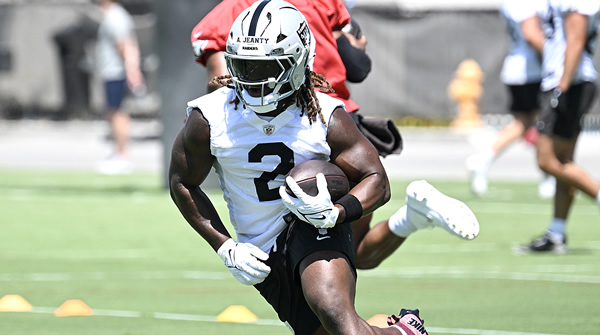 A Fantasy Football Community! |
||
| Log In | Sign Up
| Contact |
Calculating Ashton Jeanty's Value
|
||||||||||||||||||||||||||||||||||||||||||||||||||||||||||||||||||||||||||||||||||||||||||||||||||||||||||||||||||||||||||||||||||||||||||||||||||||||||||||||||||||||||||||||||||||||||||||||||||||||||||||||||||||||||||||||||||||||||||||||||||||||||||||||||||||||||||||||||||||||||||||||||||||||||||||||||||||||||||||||||||||||||||||||||||||||||||||||||||||||||||||||||||||||||||||||||||||||||||||||||||||||||||||||||||||||||||||||||||||||||||||||||||||||||||||||||
| By Steve Schwarz | 7/31/25 |
| After deciding how to evaluate Christian McCaffrey, the next most important fantasy decision is the question of how to evaluate rookie running back Ashton Jeanty, the No.6 overall selection of the Las Vegas Raiders. Running backs rarely get selected this high and when they do, they usually get plenty of work right off the bat. Therefore, we need to know the following questions; 1) Is Jeanty for real? Let’s begin. He certainly seems for real. He ran roughshod over every NCAA
opponent last season leading the nation with 374 rushing attempts
for 2,601 yards and 29 touchdowns. That total included 192 yards
and three scores against highly-ranked Oregon, 259 yards and four
scores versus Washington State and 104 yards in a playoff game
against Penn State. He finished second in the Heisman voting and
was the Maxwell Award winner. Heís short at 5í9,Ē but solidly
built at 215 lbs. Short means little in the scheme of thingsÖ
Barry Sanders was short, so was Emmitt Smith and Maurice Jones-Drew.
I definitely got MJD vibes when I saw him run and thatís a good
reference point. MJD was a very good fantasy running back, who
averaged over 17 FPts/G in five of his first six seasons. How will head coach Pete Carroll use his new ďtoy?Ē Fortunately, we have a lot of data for Carroll, who was the Head Coach at Seattle from 2010-2023 and before that at New England and a year at the New York Jets. If we look at his years in Seattle, when he had a great running back in Marshawn Lynch and a young inexperienced quarterback in Russell Wilson, he rode his backs hard. From 2011-2014 his running back room averaged 404 rushing attempts of which Lynch saw an average of 295 carries (73%). As Wilson matured and Carroll trusted him, his teams ran slightly less (average 377 times). They also ran less because Lynch was gone and Chris Carson was the lead back. With the more recent combination of Geno Smith and Kenneth Walker, the team ran about 345 times and Walkerís share was 225 times (65%), but he had a solid backup in Zach Charbonnet. They also had a great group of receivers (DK Metcalf, Tyler Lockett and Jaxon Smith-Njigba). With a lesser group of pass catchers in Las Vegas (Brock Bowers, Jakobi Meyers and Tre Tucker or Jack Bech or even Dontíe Thornton), Carroll figures to run more Ė Iím thinking the 377 level again. If we assume he will use Jeanty similar to his Lynch usage (73%) that means carries 275 carries for the rookie. He didnít catch much in his final season (23 receptions), but he did catch 43 balls in the previous season, so Iím assuming he has decent hands. Also, he seems durable. Despite rushing an average of 26.7 times his junior year (2024), he missed no games. He played in 40 of 42 games over three college seasons at Boise State. What is the best possible outcome for Jeanty? Sorry, heís no Eric Dickerson (see historic table below). He also wonít catch balls like Saquon Barkley did his first year. Heís also not Edgerrin James with a prime Peyton Manning-to-Marvin Harrison to distract defenders. And with his middle-of-the-pack, run-blocking OL (see Doug Orthís analysis of offensive linemen) he wonít be as efficient as Clinton Portis was in 2012 for the Denver Broncos with similar usage. Letís look at Kareem Huntís 2017 rookie season. Similar usage running the ball and maybe slightly more receiving work than can be expected, but close. I think fantasy owners would love to have Huntís 18.58 FPts/G and I make that Jeantyís ceiling. Last season, that production level would have put him as the No.6 running back behind only; Barkley, Jahmyr Gibbs, Derrick Henry, Bijan Robinson and Alvin Kamara. Jeanty is currently being drafted at ADP 8.5 and the fifth running back off the board. What does the fifth-best running back each year produce? (See final table) Last season it was Kamara at 19.0 FPts/G, but thatís slightly above the most recent averages. Since 2015, the fifth-best running back each season has produced like this: 13.7 games played, 237.1 rushing attempts, 1051.9 rushing yards, 8.0 rushing touchdowns, 51.4 receptions, 404 receiving yards and 1.8 receiving touchdowns for an 18.7 FPts/G average (based on at least six games played). But what of Jeantyís floor? How bad could it be if heís not elite? What if veteran backup, Raheem Mostert, gets more work than expected. Or Mostert is the red zone touchdown guy like he was in 2023 when he scored an amazing 21 times? What if Sincere McCormick is somehow involved? Under those conditions, I make Jeantyís floor at similar to Kenneth Walker in 2022 at 13.50 FPts/G (228-1050-9 and 27-165-0). This production level would be very disappointing for fantasy owners, probably fatal to your title hopes and dreams. Is Jeanty worth his current ADP? At his current ADP, you are expecting Jeanty to play at, or near, his ceiling. Thatís dangerous, because you are saying, if he plays his very best, you are just getting an ďas expected or fair-market value.Ē While thatís nice, itís not a championship maker, itís not a bargain, heís not going to overproduce and if heís average or less he will under-produce for his draft slot. With the unknown factors of a rookie, an all-new coaching staff and a new quarterback, I think there are better options with less risk. If you must get a running back, I love DeíVon Achane this season. If we add receiver options, I like Puka Nacua, Malik Nabers, Nico Collins and Amon-Ra St. Brown. None of the five alternates I mentioned are likely to destroy your championship dreams after your first pick on Draft Day.
|
|||||||||||||||||||||||||||||||||||||||||||||||||||||||||||||||||||||||||||||||||||||||||||||||||||||||||||||||||||||||||||||||||||||||||||||||||||||||||||||||||||||||||||||||||||||||||||||||||||||||||||||||||||||||||||||||||||||||||||||||||||||||||||||||||||||||||||||||||||||||||||||||||||||||||||||||||||||||||||||||||||||||||||||||||||||||||||||||||||||||||||||||||||||||||||||||||||||||||||||||||||||||||||||||||||||||||||||||||||||||||||||||||||||||||||
|
FOLLOW US |
